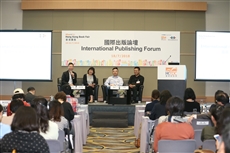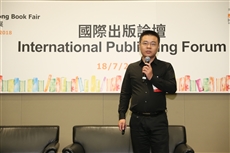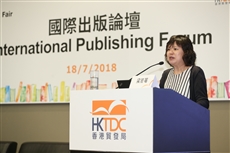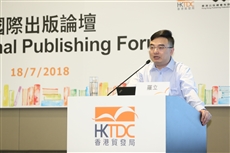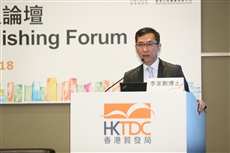Technology Seen to Create New Opportunities for Publishing
20 July 2018- Technology has changed the publishing industry more than anyone could have predicted just a decade ago. While this has led to many publishers leaving the market, it has also created exciting opportunities for others that are ready to adapt and embrace new technology, according to speakers at the International Publishing Forum, held on 18 July at the 29th edition of the HKTDC Hong Kong Book Fair.
Sharing their views and experience at the forum themed “The Global Trend of Publishing with the Application of Technology” were Fang Jun, a knowledge services expert and Partner at KChain Lab; Natasha Leung, Senior Publishing Manager at publishing and education company Pearson Hong Kong; and Luo Li, Senior Vice-President at China Literature, the operator of a leading online literature platform in China. The forum included a Q&A session in the final half hour, moderated by Edmund Chan, Director of the Hong Kong Publishing Federation.
Paid Knowledge
Mr Fang discussed the potential for paid knowledge in the Internet age, specifically paid-subscriber online columns, which can be personalised, can be offered on audio channels, and can help build new online communities for people with common interests. “This is becoming a major market,” he said. “Within only a year, some columnists have become very popular.”
For a paid knowledge product to be successful, he said, it must lead online users to act and provide an interactive experience. An appropriate app can enable communication and sharing, which is what makes cinemas, gyms and cafés popular, said Mr Fang. People can watch films, work out and have a coffee at home, but they prefer to do so in a social environment. Similarly, many people enjoy sharing and discussing what they are reading, the speaker noted.
“In the past 50 years, Hollywood dominated the field of entertainment,” concluded Mr Fang. “But in the future, Silicon Valley may take over.”
Artificial Intelligence
Ms Leung, from Pearson Hong Kong, best-known for its English-learning textbooks from pre-primary to higher education under the Longman brand, described the company’s collaboration with International Business Machines (IBM) and Microsoft in adapting artificial intelligence (AI) to English learning in higher learning and primary school, respectively.
Pearson’s collaboration with IBM involves adapting IBM’s AI engine, Watson, to Pearson’s higher-education platform, she explained. Watson allows Pearson to create custom curricula to match each student’s needs and ability and provide students with a virtual one-on-one tutor, which asks them questions about the content and gives hints or adapts the information for each student to guide them on their learning path. Teachers can also use the data provided to focus on individual students’ needs.
Pearson’s collaboration with Microsoft started with the successful launch of Longman English+, an English learning application (app) last year, integrating Longman’s Welcome to English series and Microsoft’s AI technology.
The WeChat-based interactive Longman English+ app being piloted this year on the Chinese mainland covers three main language areas: vocabulary, listening/speaking, and phonics. In the listening and speaking section, the students listen and then read a passage. They get an instant score and words that need improving are colour coded. They also participate in a scenario dialogue, with the app asking questions and the students answering. In the phonics section, the students read commonly confused sounds and receive personalised feedback. The scoring system uses a complex algorithm. “Pearson’s vision is to become a lifelong learning partner offering personalised learning to help make a positive difference in people’s lives,” concluded Ms Leung.
Digital Reading
Mr Luo of China Literature focused on development trends in digital reading. "Changes in technology, particularly AI, will have a great influence on our reading habits,” said Mr Luo. “The content has not changed. Reading is still the most fundamental demand in entertainment, and it satisfies people’s desire for knowledge. But how audiences are targeted has changed.”
Companies such as China Literature, a leader in the mainland’s online literature field, are providing more personalised services than ever and the technology used to provide varied reading formats and target readers will continue to improve, he said. China Literature also provides services for authors. In the past, for example, writers of historical fiction may have had to travel across the world to visit places such as the British Museum to verify historical information, but now China Literature has accumulated a huge number of historical and other documents online to help make writing more efficient.
Mr Luo spoke of the marketing revolution that is taking place in the online literature field. Online literature can never compete with the entertainment industry regarding promotion expenditure, so players are using new technology, such as WeChat and key opinion leaders (KOLs). The KOL’s can be a very efficient means of promotion because a popular KOL can reach up to 10,000 readers. They are also using virtual figures instead of celebrities to promote their books, reducing costs and giving instant feedback to followers through the use of AI.
With Big Data technology, platforms such as China Literature can analyse data from individual users and promote material based on their past reading experience, recommending content that is potentially attractive and even tailoring the introduction or welcome page of their website to their interests. This is similar to the technology social media and online shopping platforms are using. Big Data also provides China Literature with an analysis of the popularity of each novel by city, and by reader age and gender, for example.
Another way in which technology is affecting online literature is by providing greater interactivity. There are now more audio books, robot reading, virtual reality and augmented reality, which are enabling many new scenarios and many new types of reading experiences.
“The love of reading will continue as long as humans exist,” concluded Mr Luo. “But the reading experience will change. We need to broaden our vision and include technology in this experience.”
|
|
Speakers discuss the latest challenges and opportunities for the publishing industry in the digital age at an International Publishing Forum themed “The Global Trend of Publishing with the Application of Technology”, held on 18 July at the HKTDC Hong Kong Book Fair 2018
|
|
|
Fang Jun, Partner at KChain Lab, examines the potential for paid knowledge in the Internet age, specifically paid-subscriber online columns |
|
|
Natasha Leung, Senior Publishing Manager at Pearson Hong Kong, describes the company’s collaboration with IBM and Microsoft in adapting artificial intelligence (AI) to English learning in higher learning and primary school, respectively |
|
|
Luo Li, Senior Vice-President at China Literature, talks about development trends in digital reading |
|
|
Elvin Lee, Chairman of the Hong Kong Publishing Federation, delivers opening remarks at the forum |
The 29th HKTDC Hong Kong Book Fair
|
Date |
18-24 July 2018 (Wednesday to Tuesday) |
|
Opening Hours |
18 - 19 July: 10am-10pm 20 - 21 July: 10am-Midnight (Hall 3 open till 11:00 pm)
22 - 23 July: 10am-10pm |
|
Venue |
Hong Kong Convention and Exhibition Centre |
|
Admission |
Adult Ticket: HK$25 Child Ticket: HK$10 (for primary school students / children under 1.22m tall)
* Children under 3 and adults over 65 will be admitted free of charge |
|
Tickets |
Tickets are available now at Hong Kong Ticketing and designated 7-11 and Circle K stores. Visitors can also purchase tickets onsite at the fairground ticket office.
The public can purchase admission e-tickets via Tap & Go mobile wallet and Octopus & O! ePay App from now on. More information is available on Tap & Go and Octopus websites. |
|
Concessionary Tickets |
Morning Admission Ticket (entry before noon): HK$10 (only on sale at the fairground each day) Special Re-entry Promotion: Visitors who purchase a regular adult ticket (HK$25) or child ticket (HK$10) dated 18 or 19 July can enjoy one-time free admission on 20, 21 or 22 July (Fri, Sat, Sun) after 5 pm by presenting the whole stub attached to the admission ticket.
The offer is not applicable to other types of admission tickets (including morning admission tickets, concessionary tickets, VIP tickets and complimentary tickets.) Visitors with Hong Kong Book Fair tickets that are valid for 18-24 July can also visit the second Hong Kong Sports & Leisure Expo Super Pass: HK$80
Pass holders have unlimited access to the Book Fair and can use a special entrance to avoid queuing. |
|
Book Fair Website / Mobile app |
http://hkbookfair.hktdc.com/HKBookfairApp.html (For details and seminar registration) |
|
Cultural July Website |
|
|
Hong Kong Sports & Leisure Expo Website |
Media enquiries
Please contact the HKTDC's Communications & Public Affairs Department:
Sunny Ng Tel: (852) 2584 4357 Email: sunny.sl.ng@hktdc.org
Angel Leong Tel :(852) 2584 4194 Email: angel.lw.leong@hktdc.org
Joshua Cheng Tel: (852) 2584 4395 Email: joshua.cp.cheng@hktdc.org
About the HKTDC
Established in 1966, the Hong Kong Trade Development Council (HKTDC) is a statutory body dedicated to creating opportunities for Hong Kong's businesses. With 50 offices globally, including 13 on the Chinese mainland, the HKTDC promotes Hong Kong as a platform for doing business with China, Asia and the world. With more than 50 years of experience, the HKTDC organises international exhibitions, conferences and business missions to provide companies, particularly SMEs, with business opportunities on the mainland and in international markets, while providing business insights and information via trade publications, research reports and digital channels including the media room. For more information, please visit: www.hktdc.com/aboutus.


